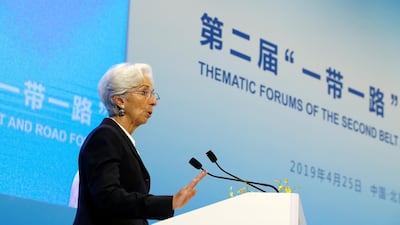The International Monetary Fund director Christine Lagarde on Thursday praised China's plans to address the debt risks of the country's Belt and Road Initiative while highlighting the need for sound fiscal policies.
The Belt and Road Initiative (BRI) would be more effective through increased capital flows across borders and higher financial inclusion with the help of financial technology (FinTech), Ms Lagarde said on Thursday in Beijing. It follows Chinese finance minister Liu Kun's comments that China aims to make the Belt and Road initiative sustainable and prevent debt risks.
"China’s increased focus on the long-term success of Belt and Road Initiative projects, and the announcement today by Finance Minister Liu of a BRI debt sustainability framework, are very welcome steps in the right direction," Ms Lagarde said.
The IMF director's comments came during a three-day Belt and Road summit in Beijing. The initiative is backed by Chinese President Xi Jinping and has faced some criticism as as a number of partner nations raise concern about the high cost of projects. China's move is aimed at easing concerns that the infrastructure plan to boost trade and investment creates a heavy debt burden for some countries.
Ms Lagarde said the financial connectivity behind the BRI can be achieved firstly by increasing capital mobility that supports inclusive growth. This can be done by boosting investments in infrastructure, manufacturing and health care.
"Making progress on major infrastructure needs will require capital flows to rise again and to be managed safely," she said.
Better capital flows can also bring down the cost of finance, improve the financial sector's efficiency and allow capital to support productive investments and new jobs.
"That is certainly the case here in China, where a further opening of the bond market to foreign investors will enable diversification and foster the internationalisation of the renminbi [or yuan currency]," she said.
Secondly, including the unbanked population in the economies through FinTech can help make the BRI more effective.
Nearly half of the adult population in low and middle-income Asia-Pacific economies do not have a bank account, according to the IMF. Less than 10 per cent have ever borrowed from a financial institution
If the least financially inclusive countries in Asia narrowed the finance gap to the level of Thailand - an emerging market economy - the poverty rate in those countries could be reduced by nearly 4 per cent, an IMF analysis shows.
This can be done by enabling more women and rural dwellers to access financial services, Ms Lagarde said.
The financial gender gap for women in developing countries is about 9 per cent, largely unchanged since 2011.
Financial connections that can be forged by the BRI can lead to new construction, new jobs, new opportunities and, ultimately, the ability to achieve economic security.
"If we find ways to harness the potential, we can build more prosperous, inclusive economies that benefit all," Ms Lagarde said.


